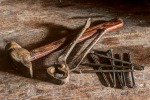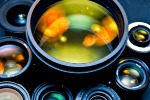Not another online photography course
Well, it's understandable. Yet another online photography course?
The Internet doesn't suffer the lack of online photography courses, online photography in general, or anything else "online", for that matter. This one is different, though. For once, it doesn't even try to be one.
You may want to rotate your phone in order to improve your browsing experience on this site.
It doesn't give any directions, rather suggestions and recommendations. More often, it's just information, and you are the one to make conclusions and decisions how to use it.
Why is that? In my opinion, photography isn't a science. Yes, understanding its basics requires some delving into physics, and yes, there are some useful rules and techniques. But these rules are never imperatives, and these techniques are free to shift and adapt. There's nothing set in stone: as long as you are aware of breaking a rule in order to achieve some goal, as long as you do it knowingly, you are very much welcome to go ahead and try. After all, you are the one in command here.
The first lesson
Here's your first lesson of this tutorial:
- Whenever you decide to take a picture, be in control.
- Understand what you want to achieve.
- Make your camera take the image you have in your head.
- Make it unmistakably yours.
“You don't take a photograph, you make it.”
Ansel Adams
Don't be a monkey (with a camera)

If this weren't true, it would be definitely worth to be made up...
Remember the story? In 2011, British nature photographer David J Slater made a trip to Indonesia to photograph local fauna. While at that, some macaques got hold of his camera set up on a tripod to take pictures of them and, instead, started taking pictures themselves. While many an image ended up totally blurred or otherwise botched, some of the pictures miraculously turned out just fine, by any standards. These particularly included some striking portraits of both the pranksters and the unlucky camera owner.
After the image above had been uploaded to Wikimedia Commons and declared void of copyright as taken by an animal, a real war ensued between the photographer demanding its removal and the organization behind Wikipedia. This eventually led to a clarification by the U.S. Copyright Office stating that "To qualify as a work of 'authorship' a work must be created by a human being... Works that do not satisfy this requirement are not copyrightable. The Office will not register works produced by nature, animals, or plants." (If you missed the case, just enter "monkey selfie" in a search engine of your choice.)
I don't want to take sides in the ongoing confrontation. While the effort of getting to the location on the part of the photographer is undeniable, so is his participation in the creation of the images questionable, to say the least. There was no intent on his part to create them the way they came into being. He didn't give his camera away on purpose. He definitely didn't direct monkeys to take the photos. In no way did he contribute to the resulting images.
His camera did, yes. But is it enough to claim the authorship? I don't know.
Think about it
Why retelling this? It's an exciting story, for sure, but just ask yourself whether your images are rather those of your camera. If you think they are, and if you want to change this, keep reading!
What's in there
- Brief history of photography
- History of photography, from the early beginnings to the present day: Part 1 of the series.
- Camera exposure and its elements
- Understanding camera exposure principles and settings, including exposure compensation, bracketing, and manual exposure.
- Photography composition
- Composition is ultimately what your photography stands or falls with. Even with the exposure nailed down, if your images don't engage the viewer, nobody will bother. Read here what matters in order to succeed.
Series on history of photography
- Nicéphore Niépce, Louis Daguerre, and the first photographs
- Part 2: The light gets captured.
- Calotype and the first negatives
- Part 3: The first negative-positive process makes multiple prints possible.
- Collodion process and glass plate predominance
- Part 4: The best of two worlds.
- George Eastman and the first film camera
- Part 5: The dawn of the film.
Detailed articles on camera exposure
- Aperture and depth of field
- Learn what aperture is, and how its different settings can change the look of your images.
- Shutter speed and motion blur
- Learn how exposure time can add dynamic and movement to your images.
- ISO and digital noise
- Learn how photo noise is related to your chosen ISO value.
- Metering modes
- Understand different metering modes and when to use them.
- Exposure compensation and bracketing
- Learn how to overcome shortcomings of your camera's automatic exposure metering.
- The sunny 16 rule and manual exposure
- Measure up to your camera and take exposure in your own hands with this simple and easy to follow rule.
What's to come
This online photography course will eventually cover following topics:
- The nature of light, colours, and colour spaces
- Focusing, depth of field, and hyperfocal distance
- Post-processing, and more!
Tags: #photocourse #onlinetutorial #betterphotography
|
Tell me what you think!
Is it useful 👍? Awful 👎? Leave a message! Your comments help make this site better (and give me a kick—one way or another).
Popular articles
-
A kind of magic
If a digital picture has to be seen in the real world, printed on a real medium and displayed in a real showcase, its transition from RAW to real is better done in an old school image editor. Enter A…
-
A duck for a dog
If you got your own place on the Internet, helping your visitors find what they are looking for is a great way to engage them and keep them staying a bit longer. A custom site search can achieve just …
-
"Might as well have the best"
Aiming for better images? Think better lenses! This is your most important piece of gear, so you better get it sorted out. — Need some advice?


 Become a patron for
Become a patron for